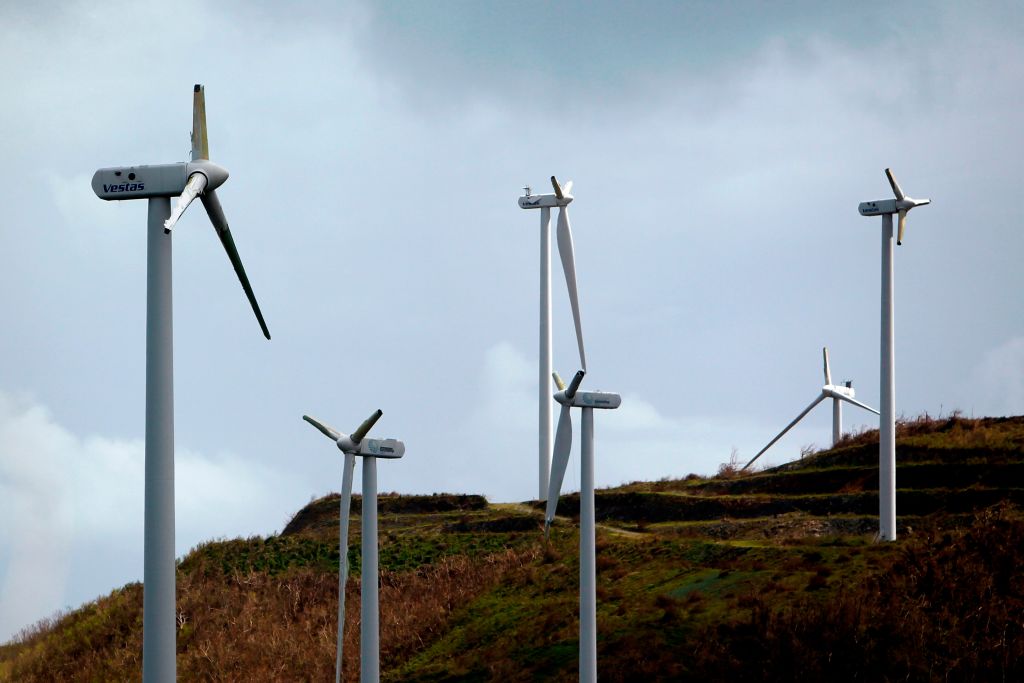Climate change could devastate wind farming


A free daily email with the biggest news stories of the day – and the best features from TheWeek.com
You are now subscribed
Your newsletter sign-up was successful
Watch out, windmills.
A new report published Monday in the journal Nature Geoscience warns that wind farming could be seriously affected by climate change, as high rates of carbon emissions lead to more carbon dioxide in the atmosphere, thus trapping more heat on the Earth's surface. The resulting increased temperatures would reduce wind output in the global north while likely increasing it in the south, the scientists explain.
Using climate models and projections employed by the U.N., the researchers predicted that Japan, the central United States, and the U.K.'s wind energy industry would see significant losses in wind output if carbon emissions continued at high rates. The central U.S. would lose nearly 20 percent of its power alone, while Japan and the U.K. would lose 10 and 5 percent respectively.
The Week
Escape your echo chamber. Get the facts behind the news, plus analysis from multiple perspectives.

Sign up for The Week's Free Newsletters
From our morning news briefing to a weekly Good News Newsletter, get the best of The Week delivered directly to your inbox.
From our morning news briefing to a weekly Good News Newsletter, get the best of The Week delivered directly to your inbox.
The study did note "substantial regional variations" in its calculations, explaining that the "northern mid-latitudes" experienced more "robust responses" to carbon emissions, while wind power in the southern hemisphere was less distorted by climate change. The Guardian notes that wind in the northern hemisphere is fueled by severe temperature differences between the cold Arctic region and the warmer tropics, which means that a warmer Arctic would reduce wind output.
In the southern hemisphere, however, climate change could actually lead to more wind in regions like eastern Australia, eastern Brazil, and West Africa because of the temperature increase of coastal lands in comparison to ocean waters.
"We found some substantial changes in wind energy, but it does not mean we should not invest in wind power," said Kristopher Karnauskas, an assistant professor in the Department of Atmospheric and Oceanic Sciences at the University of Colorado at Boulder. Read the full study at Nature Geoscience.
A free daily email with the biggest news stories of the day – and the best features from TheWeek.com
Kelly O'Meara Morales is a staff writer at The Week. He graduated from Sarah Lawrence College and studied Middle Eastern history and nonfiction writing amongst other esoteric subjects. When not compulsively checking Twitter, he writes and records music, subsists on tacos, and watches basketball.
-
 Political cartoons for February 20
Political cartoons for February 20Cartoons Friday’s political cartoons include just the ice, winter games, and more
-
 Sepsis ‘breakthrough’: the world’s first targeted treatment?
Sepsis ‘breakthrough’: the world’s first targeted treatment?The Explainer New drug could reverse effects of sepsis, rather than trying to treat infection with antibiotics
-
 James Van Der Beek obituary: fresh-faced Dawson’s Creek star
James Van Der Beek obituary: fresh-faced Dawson’s Creek starIn The Spotlight Van Der Beek fronted one of the most successful teen dramas of the 90s – but his Dawson fame proved a double-edged sword
-
 ‘One Battle After Another’ wins Critics Choice honors
‘One Battle After Another’ wins Critics Choice honorsSpeed Read Paul Thomas Anderson’s latest film, which stars Leonardo DiCaprio, won best picture at the 31st Critics Choice Awards
-
 Son arrested over killing of Rob and Michele Reiner
Son arrested over killing of Rob and Michele ReinerSpeed Read Nick, the 32-year-old son of Hollywood director Rob Reiner, has been booked for the murder of his parents
-
 Rob Reiner, wife dead in ‘apparent homicide’
Rob Reiner, wife dead in ‘apparent homicide’speed read The Reiners, found in their Los Angeles home, ‘had injuries consistent with being stabbed’
-
 Hungary’s Krasznahorkai wins Nobel for literature
Hungary’s Krasznahorkai wins Nobel for literatureSpeed Read László Krasznahorkai is the author of acclaimed novels like ‘The Melancholy of Resistance’ and ‘Satantango’
-
 Primatologist Jane Goodall dies at 91
Primatologist Jane Goodall dies at 91Speed Read She rose to fame following her groundbreaking field research with chimpanzees
-
 Florida erases rainbow crosswalk at Pulse nightclub
Florida erases rainbow crosswalk at Pulse nightclubSpeed Read The colorful crosswalk was outside the former LGBTQ nightclub where 49 people were killed in a 2016 shooting
-
 Trump says Smithsonian too focused on slavery's ills
Trump says Smithsonian too focused on slavery's illsSpeed Read The president would prefer the museum to highlight 'success,' 'brightness' and 'the future'
-
 Trump to host Kennedy Honors for Kiss, Stallone
Trump to host Kennedy Honors for Kiss, StalloneSpeed Read Actor Sylvester Stallone and the glam-rock band Kiss were among those named as this year's inductees
